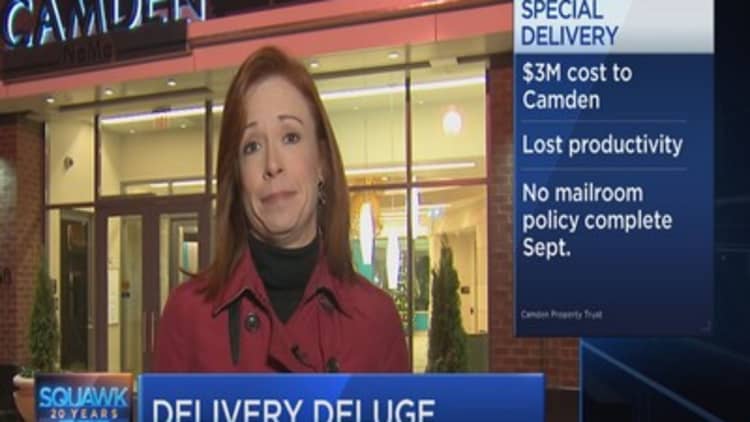
At Bailey's Crossing, a luxury rental apartment building in Alexandria, Virginia, delivery people from UPS, Federal Express, Amazon and the U.S. Postal Service are parading in with the carts overflowing from Cyber Monday shopping.
They will not, however, bring all those packages, large and small, up to the tenants or to the building's front desk. There are simply too many. With online shopping now making up at least 10 percent of all retail, apartment building mailrooms are bulging, and landlords are balking.
"In our portfolio, which is 11,000 units in operation right now and 4,000 under development, this year we have an estimated 300,000 packages coming in," said Mark Alfieri, CEO of Monogram Residential Trust , which owns and manages Bailey's Crossing. "It's become a real challenge for the industry over the last several years as online shopping has increased."
So Monogram installed a high-tech locker system in the building's garage. It is powered by LuxerOne, a San Francisco-based firm that launched in 2005 with an automated laundry locker system. Delivery people stand at an iPad screen, punch in a delivery code, find the recipient's name and have the iPad take a picture of the package's mailing label. They then choose a locker size, which will be assigned to the package. Once the package is in, the system sends a text message to the building tenant, letting them know the package has been delivered and is ready to be retrieved. The tenant can come down, punch in the code that was texted, and the locker assigned to their package will pop open.
"We were overwhelmed with the package deliveries, so we decided to look at all the options that were available," said Jennifer Marsh, community director at Bailey's Crossing.
A typical apartment community receives more than 100 packages a week and that number can more than double during the holidays, according to a 2014 survey by National Multifamily Housing Council. One in 4 apartment communities use specialized software to manage packages on site. Still, at the end of last year, just 1 in 10 were using package lockers.
At another Monogram building a few blocks away, packages still come to a closet by the front desk, but they are scanned immediately, and tenants are then alerted by text through Entrata, a messaging software system originally designed for property management companies to collect rent. Now it has added "Parcel Alert." Monogram is also testing a cold storage locker in one of its Boston properties to handle the rising tide of food deliveries.
"There is a cost associated with it, but we believe our residents pay at a level that warrants this type of service," said Alfieri, noting that the average rent at Monogram properties starts at $2,000 a month. LuxerOne can range from $21,000 to $34,000 to install, depending on the size and number of lockers.The response to the package glut was just the opposite at Camden Property Trust, one of the largest residential REITs in the nation, with a portfolio of over 59,0000 apartment units in spanning 10 states and the District of Columbia. They simply said, enough is enough and no longer accept packages in the mailrooms at the vast majority of their buildings.
"Lost productivity is absolutely a part of it," said Kristy Simonette, senior vice president of strategic services and CIO of Camden, who said the REIT was losing about $3 million a year due to the package glut. "It really came down to allowing our employees to service our residents and take care of our real estate, which is really the business that we're in."
Residents at Camden can opt to allow package carriers to leave parcels at their front doors. Camden claims 75 percent have already done so since the policy went into effect in October, and over 100,000 packages have been delivered to front doors.
"It doesn't bother me because we have a lot of security here," said Michelle Young, a resident at one of Camden's Washington, D.C., buildings. "I've seen packages left at people's doors for weeks."
Young, however, lives in one of Camden's priciest urban properties, one of very few that will accept packages. Tenants get an email alerting them that their delivery is at the front desk. Most Camden properties, however, do not offer that service.
Simonette said they have not seen any increase in theft or lost packages, and they have not seen anyone move out. She acknowledges that some tenants have said they will not renew their leases.
"I think with any kind of change, it always makes people uneasy, so as we rolled out across the country we did have a few animated, unhappy residents that did voice their concerns, and we try to help them understand why we made the decision and also assist them in finding an alternative pickup place," said Simonette.
Camden has considered a locker system like Monogram's, but after projecting the increase in package deliveries over the next decade, it concluded that it was just not a reasonable solution. With rental occupancy at an all-time high nationally and demand still historically strong, large operators like Camden clearly do not see package control as a necessary amenity.
As for the possibility of drones landing at Camden properties someday?
"We'll cross that bridge when we come to it," Simonette said with a laugh.



